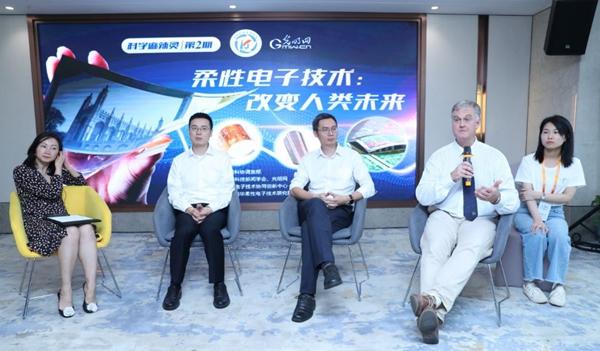

A scientific salon themed "Flexible Electronics Reshaping Human Future" takes place in Hangzhou, Zhejiang province on July 13. [Photo by Zhou Ye]
Electronic displays that can fold like a handkerchief, clothing that can monitor physical signs, and adhesive bandages capable of monitoring body temperature, heart rate and blood glucose. To many people, these things exist only in science fiction, but with the application of flexible electronic technology, they have become reality.
Flexible electronics, also known as flex circuits, have the potential to revolutionize information technology. The technology has attracted worldwide attention and has undergone rapid development in recent years.
Feng Xue, director of Tsinghua University's Center for Flexible Electronics Technology, believes that flexible electronic technology will bring about dramatic changes to traditional information devices and systems, changing their physical form from being "rigid" to "flexible."
"It will dramatically change the way information is collected, processed, transmitted and displayed, and help better deliver the goal of connecting everything," said Feng, speaking at a scientific salon in Hangzhou, Zhejiang province, on July 13.
Themed 'Flexible Electronics Reshaping Human Future," the salon was the second of a series of scientific salons the China Association for Science and Technology is sponsoring for scientists and journalists to sit together and address scientific topics of common concern.
Feng illustrated how flexible electronics impact human life and production by explaining their diverse applications in medical care and manufacturing.
According to Feng, his team has developed a non-invasive skin-like biosensor for real-time blood glucose monitoring, based on flexible electronic technology, and the device has similar accuracy with traditional method. In manufacturing, Feng showed, among other examples, how flexible electronics help monitor the operation of axles of high-speed trains.
Chen Xiaodong, a professor of physics and applied physics at Nanyang Technological University, Singapore, envisions flexible sensors on human clothing, accessories, skin and bodies that will connect the human body to the Internet of Things. And he refers to this as bodyNET.
It takes a large number of flexible sensors to convey the complicated physical, psychological and biological signals of the human body, a necessary step to achieve human-machine interaction and bodyNET, according to Chen.
When asked about the biggest challenges for bringing academic ideas to the market, Paul Burn, a professor at the University of Queensland, Australia, warned against the "Valley of Death" for a technology in their Technology Readiness Level (TRL), a common method for estimating the maturity of technologies on a scale of 1 to 9, with 9 being the most mature technology and out in the market.
According to Burn, the "Valley of Death" refers to the gap from TRL 4 to 8 when a technology might fail to go to the next level.
"What happens (when a technology reaches the 'Valley of Death') is that the academics get very excited about their technology and think it is the best thing ever, but when they present it to potentially a company and are asked to produce a prototype, they don't have one," said Burn.
"It's really how you translate prototypes into something that you can sell to the next stage, and the next stage could be a company that would be able to go through the processes to a product, or a venture capital organization, or a government agency that would have the ability to provide the resource to enable you to do the next stage," Burn added.
Feng, Chen and Burn, who are trained in different disciplines but are all engaged in flexible electronics research, agreed that flexible electronics require much cross-disciplinary input.
"I cannot find another field that involves more disciplines than flexible electronics do," said Chen, seeing flexible electronics as a case of the "emerging engineering education" that China has vigorously promoted over the past two years that emphasizes cross-disciplinary research.(Yuan Fang)
